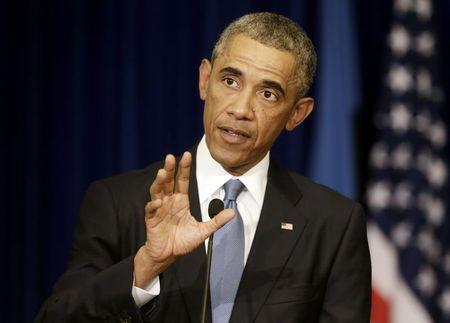TALLINN - U.S. President Barack Obama said on Wednesday a ceasefire in Ukraine could be effective only if Moscow stopped "pretending" it was not controlling pro-Russian separatists and ceased sending troops and weapons into the country.
Obama was speaking in Estonia, one of three ex-Soviet Baltic states bordering Russia that fear separatist rebellion in eastern Ukraine could herald problems for them. All three have sizeable Russian minorities and rely on Russian fuel deliveries
Ukraine said on Wednesday its president had agreed with Russia's Vladimir Putin on steps towards a "ceasefire regime" in Kiev's conflict with separatists, but the Kremlin denied any actual truce deal, sowing confusion on the eve of a NATO summit.
“We have consistently supported the effort of president (Petro) Poroshenko of achieving a meaningful ceasefire that could lead to a political settlement," Obama told a news conference in Tallinn during a brief visit intended to underline U.S. commitment to a frontline eastern NATO state.
"So far it hasn’t helped, either because Russia has not been serious about it or it’s pretended that it’s not controlling the separatists, and separatists, when they thought it was to their advantage, have not abided by the ceasefire."
Russia denies it has sent armour or troops into eastern Ukraine, a largely-Russian speaking area which has seen separatist fighting since April. Over 2,600 have died in the conflict which has stirred the biggest crisis in Russia's relations with the West since the Cold War.
“In terms of actions, we’ve seen aggression and appeals to national sentiments that have historically been very dangerous in Europe and are rightly a cause of concerns," Obama said.
"No realistic political settlement can be achieved if effectively Russia says we are going to continue to send tanks and troops and arms and advisors under the guise of separatists, who are not home grown, and the only possible settlement is if Ukraine cedes its territory or its sovereignty."
Nato summit
Obama arrived in Tallinn on his way to a NATO summit in Wales to reassure the three Baltic states -- Lithuania, Latvia and Estonia -- that NATO would back them up and that the U.S. was committed to protecting the Alliance's eastern frontier.
Under the NATO treaty, an attack on any individual NATO state would be treated as an attack on all alliance members. The Baltic states joined NATO and the European Union (EU) in 2004.
Ukraine is not a member of either alliance.
But the current crisis unfolded when demonstrations in Kiev toppled a Kremlin-oriented president who had pulled back from a cooperation deal with EU in favour of closer ties with Moscow. Russia has described his fall as a coup backed by Ukrainian fascists and accuses Ukrainian forces of indiscrimate killing of ethnic Russian civilians in its bid to quell the rebellion.
Latvia has an ethnic Russian population of about 26 percent, Lithuania, somewhat lower at six percent and Estonia about a quarter Russians.
Obama said Russia was already suffering under the weight of U.S. and European sanctions as its economy was contracting, capital was fleeing and the currency was falling sharply.
"There's an opportunity here, let's see if there's follow up," Obama said.






















































